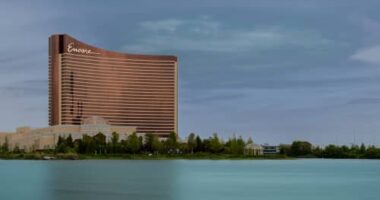Jump straight to the main content.

The Encore Boston Harbor property is renowned for its opulence and is highly coveted as a gambling hotspot. The sale of the land has been surrounded by questions for quite some time. Currently, a judge is calling for an inquiry into the significant $40 million reduction in price that Wynn obtained for the property.
This week, Chief Justice of the Appeals Court in Massachusetts, Scott Kafker, published an opinion paper raising concerns about the land sale that facilitated the development of the casino. Kafker expressed doubts regarding the sale’s circumstances, deeming them suspicious and suggesting that they should be subject to a more extensive investigation.
The verdict arrives almost eight years later since FBT Everett Realty sold the land to Wynn, raising suspicions about the Massachusetts Gaming Commission’s involvement in the transaction.
FBT and Wynn agreed to $75 million land sale
FBT and Wynn concluded a $35 million agreement in 2014 for the riverfront property where Encore Boston Harbor is currently situated. The deal appeared straightforward, yet a peculiar aspect emerged: initially, FBT had intended to ask for $75 million for the land.
What transpired between the initial request and the ultimate selling price? The explanation could resemble a plot straight out of a crime film. Kafker’s perspective provides a comprehensive account of the sale’s specifics and sheds light on the potential $40 million decrease in price.
In 2009, FBT acquired the property for a sum of $8 million. However, the situation took a favorable turn for FBT in 2011 when Massachusetts introduced the Expanded Gaming Act. This legislation transformed FBT’s riverfront property into an exceptional site for a casino. Recognizing the opportunity, Steve Wynn, the CEO of Wynn, swiftly seized upon it.
Wynn extended an offer to FBT, proposing a monthly retainer of $100,000 to secure the property. Additionally, he committed to a payment of $75 million in case he successfully acquired a Class 1 gaming license and wished to purchase the property.
A ‘hidden ownership interest’ emerges
While the sale was progressing and overcoming bureaucratic hurdles, Wynn Resorts submitted an application for a gaming license as per the regulations. The state’s Investigations and Enforcement Bureau was responsible for thoroughly examining Wynn Resorts and FBT in accordance with the vetting process. During their investigation, it came to light that Charles Lightbody, who had connections to organized crime, possessed a concealed ownership stake in FBT. Additionally, the bureau uncovered certain irregularities in FBT’s financial records.
According to FBT, the gaming commission discovered this information and subsequently exerted pressure on Wynn Resorts to negotiate a reduced sale price. FBT claims that the commission had the intention of ensuring Lightbody received a lesser amount from the sale.
According to Kafker’s perspective, he stated:
The commission expressed concern regarding the perceived lack of honesty from FBT’s leaders and their reluctance to fully assist in the IEB’s inquiry. Additionally, the commission was worried about allowing individuals with criminal records and ties to organized crime to benefit from the casino license granted to Wynn for the Everett parcel.
FBT’s hands were bound as the potential rejection of Wynn’s license by the state gaming commission would lead to the collapse of the sale. Consequently, in 2014, FBT reluctantly agreed to sell the property for $35 million. Unsurprisingly, the company expressed its discontent and asserted that the commission’s decision had incurred significant financial losses amounting to millions of dollars.
While Kafker refrained from explicitly stating that FBT’s claims were valid, he made an important observation, noting that the existing record, which is derived from the limited discovery conducted thus far, presents some evidence in favor of FBT’s allegation.
Could the gaming commission be in hot water?
Kafker stated that he believes the commission is not to be held responsible for contract interference in relation to the sale due to its immunity in such instances. However, Kafker expressed concerns that the commission’s involvement in the $40 million “discount” may potentially breach regulations pertaining to “government-compelled transfers of economic benefits.”
In essence, the commission forced FBT to transfer the FBT property to Wynn for $40 million less than the agreed-upon price, without addressing the criminal ownership issues that fall within the commission’s investigatory and law enforcement jurisdiction. Such government-mandated transfers of economic benefits between private parties in this situation raise noteworthy regulatory concerns.
What’s next?
The judge is requesting an inquiry into the $40 million reduction in price that Wynn received for the Encore property. However, Kafker emphasized that additional examination is necessary for the sale. This process, known as discovery in legal terms, requires both parties involved in a lawsuit to disclose the evidence they possess to one another.
The Massachusetts Gaming Commission expressed its satisfaction with Kafker’s decision on contract interference in a statement released on Monday. The commission stated its readiness to proceed with legal proceedings concerning its involvement in the $40 million price reduction.






